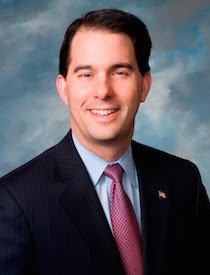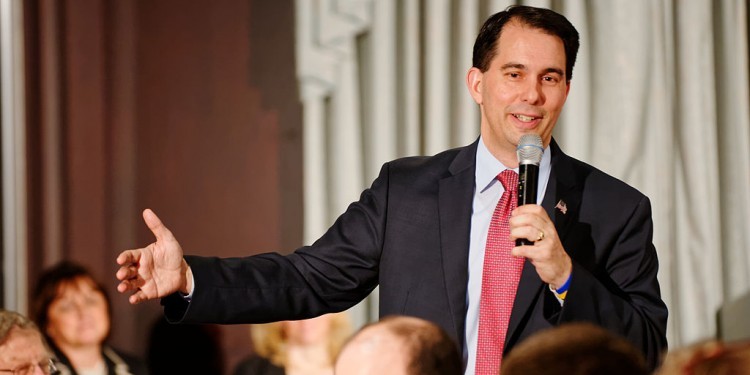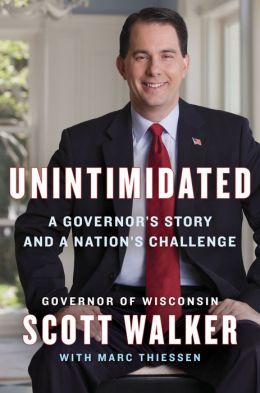Unintimidated: A Governor’s Story and a Nation’s Challenge
Thank goodness for federalism. Wisconsin Gov. Scott Walker’s timely book clearly demonstrates the essentials of talent and character in the ranks of state executives. Perhaps only a governor can appreciate what Mr. Walker wrought. I do. And it was stunning. In Oklahoma, when I proposed a right-to-work referendum, which ultimately passed by a vote of the people, the reaction from the labor movement was negative but contained. Big rigs from around the country circled the Capitol in Oklahoma City and temporarily blocked traffic, but the Highway Patrol quickly put an end to that mischief.
My fight was a brushfire. Scott Walker’s was a conflagration. It is a story well told, and one that must be learned and be a part of every courageous governor’s DNA.
In January 2011, the newly inaugurated Republican governor faced a budget shortfall of $3.6 billion. He could either raise taxes or lay off 10,000 teachers, policemen and firefighters to close the gap. Or he could do something bold. Gov. Walker chose bold. Some might say recklessly bold. But it was amazing and gutsy — and essential to Wisconsin’s prosperity.
Mr. Walker went for the throat. The state’s costly inefficiencies were the result of union dominance of the collective-bargaining process. Public-employee unions and their allies elected pliable public officials who sat across from their benefactors to negotiate public-employee contracts. Taxpayers lost. High cost and unfairness won. Collective bargaining didn’t embrace merit hiring or the dismissal of incompetent employees.
It meant archaic work rules: Who would have lunch duty? Who went on field trips? The union contract was a multi-hundred-page monstrosity. The last hired would be the first fired, a process that resulted once in the dismissal of Milwaukee’s best new teacher of the year. Mr. Walker knew that to slay the beast, collective bargaining had to be abolished. That meant it had to be abolished across the board. It must be scrubbed for state, municipal and county employees. That meant teachers, and it meant bus drivers and corrections officers.
The process was so corrupted that Madison’s highest-paid public employee was not the mayor or the police chief or even the transit chief. It was a bus driver who had put the accelerator through the floor with extensive overtime pay. The governor agreed to exempt policemen and firefighters because it was feared that if they went on strike, public safety would be seriously jeopardized. Good call, but a can kicker for a slice of the public labor force that is often ossified and heavy on early retirements and excessive benefits.
Mr. Walker first insisted that each employee pay 5.8 percent of his salary for his pension and 12.6 percent of the cost of health care. Frequently, public employees paid nothing. This would make them more competitive with private-sector workers. Collective bargaining would be ended for everything except base wages. It would also ban compulsory union membership and the forced collection of union dues. The result was Act 10.
The reaction was volcanic. Wisconsin birthed public unionization in 1936, and it was the first state to permit public workers to bargain collectively. Labor and its leftist Democratic allies would not take this sitting down. Many of the governor’s friends were stunned that he was willing to embrace the nuclear option. Some were afraid of losing. Others were timid. Why challenge the status quo? Couldn’t we somehow just compromise?
Mr. Walker held firm. He announced his program to a temporarily stunned opposition. They were not stunned for long, though. Collective bargaining equaled union featherbedding. The teachers union health care cartel cost the state millions. If collective bargaining were abolished, the good times would end. It would have to be total war.
Act 10 needed Democrats to pass. The Democrats packed up and fled to Illinois. The only way to put the binding arbitration piece into law was to separate out the money part. Then it could be passed by a simple majority. That was the governor’s strategy. By then, though, union activists from around the state and nation converged on Madison. Pounding drums, screaming “shame,” the public places of the Capitol were invaded by protesters in the hundreds and thousands. Things came to a standstill. The news media filmed thugs shaking police cars and activists harassing and spitting on many who came into the building wearing a coat and tie because they thought them to be Republicans.
Mr. Walker’s family was repeatedly threatened. Republican legislators’ homes were vandalized. The governor was called a Nazi, and his supporters were compared to rapists and terrorists. Several in this sea of offending humanity used his office back door as a urinal. Activists dressed as zombies invaded a speech by Mr. Walker in front of Special Olympians. Others glued shut the doors of a Catholic school.
Act 10 passed and was signed into law, but the unions weren’t through. Recall elections were held to defeat legislators (and even a Supreme Court justice) who had a role in the passage and survival of Act 10. Then it was Mr. Walker’s turn.
The governor would have lost the recall if his reforms had not worked. The fact that they had worked saved him. He won the recall by a larger percentage (7 points) than his original election. He became the first governor in U.S. history to beat a recall. He was no longer “Dead Man Walker.” There was more money for schools. The state pension system became fully funded. The deficit quickly turned into a $500 million surplus, and the state began to deposit money into its “rainy day” account.
Wisconsin climbed out of the fiscal ditch. It returned to the road to prosperity. A string of major legislative accomplishments followed, including limiting Medicaid only to the needy. None would have happened without the moral courage and persistence of Mr. Walker. When the agony ended, there was no gloating. The governor returned to his duties with no bitterness and no recrimination. His balance was remarkable. Be humble. Be bipartisan. Don’t personalize your differences with others. Magnanimity and firmness are rare and are the reasons for Mr. Walker’s remarkable success. As a sign carried by a supporter on the night of his recall victory crisply states, “You can’t recall courage.”
It was courage indeed.
Book Review from The Washington Times, by Frank A. Keating
Tags: Scott Walker, Unintimidated: A Governor's Story and a Nation's Challenge
- The Author

Scott Walker
Scott Walker is an American politician who is currently the 45th Governor of Wisconsin. Walker is a native of Delavan, […] More about Scott Walker.
- Related Articles

Top 10 Conservative Republican National Convention Authors
The Republican National Convention is here! From locking Hillary up to making America great again, America's premier conservatives are giving[...]
BREAKING NEWS: Scott Walker Drops Out of Presidential Race!
After two bad debate performances, Gov. Scott Walker is dropping out of the 2016 presidential race.
According To CBC Members, Ted Cruz Won First Debate
A plurality of CBC members thought Sen. Ted Cruz won the first debate. However, Donald Trump and Marco Rubio came[...]
CBC’s First GOP Debate Awards
Learn who the winners and losers were from last night, including the best zinger, best sparing, breakthrough performance, and who[...]
CBC Members Thought Ted Cruz Would Win The First Debate!
Going into the first GOP debates last night, we wanted to see which candidate CBC members thought would win the[...]
Ratings Details














